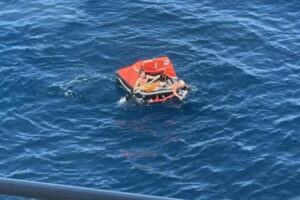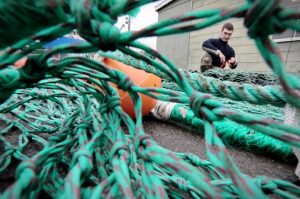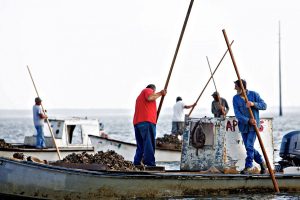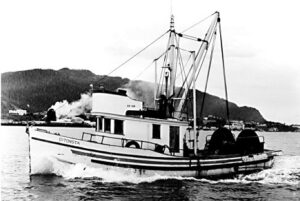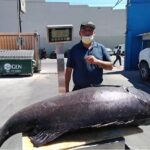The plan would launch the defense fund to help the lobster industry navigate the new rules, laws and regulations that are designed to protect a declining species of whale. Some members of the committee and the lobster industry balked at the idea, in part because it would redirect fees and surcharges the state currently uses to manage the lobster fishing industry. But Republican Rep. William Faulkingham, a commercial lobsterman himself and the sponsor of the bill to create the legal fund, said the industry will need money to win court challenges against new fishing restrictions. >click to read< 16:53
Tag Archives: Maine’s lobster industry
From boat sizes to waitlists, what lobster industry changes say about where fishery is headed
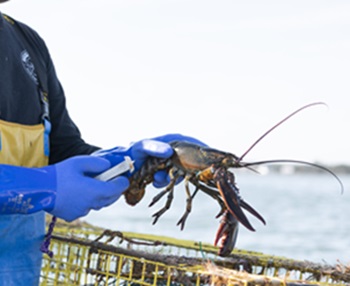 Wait times for a lobster fishing license, especially for those not born into a family of fishermen, used to exceed a decade in some parts of Maine, but the queues are getting shorter as fewer young people enter the fishery. Lobster boat captains often struggle to find enough sternmen to help and used lobster boats are taking longer to sell than they used to. The threat of climate change and more restrictive right whale protections, as well as several years of more modest landing totals, have some in the lobster industry second-guessing their future in the business, yielding subtle, but real, changes in the makeup of the fishery. In conversations with fishermen, a sense of uncertainty permeates. “It’s such an unstable way of life and it’s not getting any better,” said Nick Perreault, a fifth generation fisherman who captains a lobster boat out of Jonesport. more, >>CLICK TO READ<< 06:25
Wait times for a lobster fishing license, especially for those not born into a family of fishermen, used to exceed a decade in some parts of Maine, but the queues are getting shorter as fewer young people enter the fishery. Lobster boat captains often struggle to find enough sternmen to help and used lobster boats are taking longer to sell than they used to. The threat of climate change and more restrictive right whale protections, as well as several years of more modest landing totals, have some in the lobster industry second-guessing their future in the business, yielding subtle, but real, changes in the makeup of the fishery. In conversations with fishermen, a sense of uncertainty permeates. “It’s such an unstable way of life and it’s not getting any better,” said Nick Perreault, a fifth generation fisherman who captains a lobster boat out of Jonesport. more, >>CLICK TO READ<< 06:25
Maine Unions Lead on the Green Energy Transition
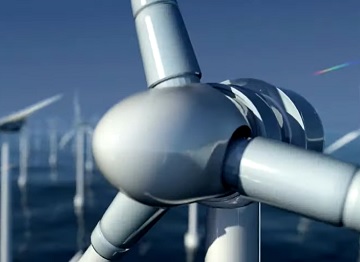 Maine’s fifteen years long OSW policy debates have been hobbled by entrenched opposition from Maine’s lobstermen. It would also be impossible to convince politicians to pass an OSW law that was oblivious to the interests of Maine’s lobstermen. Governor Mills and her team reached out to Maine Lobstermen’s Association (MLA), but they did not break through the impasse. The MLA continues to oppose OSW by arguing about potential impacts “on the marine environment, commercial fishermen and our fishing heritage.” MLA’s opposition has grown stronger in the past few years under the influence of New England Fishermen’s Stewardship Association (NEFSA), which is orchestrating conservative anti-OSW campaigns across the East Coast. To break this logjam, the MLCC worked with the country’s only lobstering union, Lobster 207. Though a small fraction of Maine lobster fishers are unionized, the lobstering union has a crucial role in advocating for improved working conditions within the lobstering industry. more, >>CLICK TO READ<< 08:50
Maine’s fifteen years long OSW policy debates have been hobbled by entrenched opposition from Maine’s lobstermen. It would also be impossible to convince politicians to pass an OSW law that was oblivious to the interests of Maine’s lobstermen. Governor Mills and her team reached out to Maine Lobstermen’s Association (MLA), but they did not break through the impasse. The MLA continues to oppose OSW by arguing about potential impacts “on the marine environment, commercial fishermen and our fishing heritage.” MLA’s opposition has grown stronger in the past few years under the influence of New England Fishermen’s Stewardship Association (NEFSA), which is orchestrating conservative anti-OSW campaigns across the East Coast. To break this logjam, the MLCC worked with the country’s only lobstering union, Lobster 207. Though a small fraction of Maine lobster fishers are unionized, the lobstering union has a crucial role in advocating for improved working conditions within the lobstering industry. more, >>CLICK TO READ<< 08:50
The Future of Fishing – Island Institute launches new initiative to support Maine’s lobster industry
 Island Institute is proud to announce a $1.4 million award from the Small Business Administration to support Maine’s lobster industry and enhance the economic resilience of the coastal communities dependent on this vital fishery. This Congressionally Directed Spending request championed by U.S. Senators Susan Collins and Angus King will launch the Future of Fishing, a collaborative effort designed to expand economic opportunities for Maine’s coastal communities, building on Island Institute’s longstanding partnerships to advance a diversified, climate-forward marine economy in Maine. Maine’s fishing communities face historic challenges such as rapidly warming waters, more frequent and severe storms, costly regulatory changes, and rising business costs. These communities, and the men and women that work on the water, are the backbone of Maine’s seafood sector; a sector responsible for more than $3 billion in total economic output and more than 33,000 jobs statewide. more, >>CLICK TO READ<< 11:28
Island Institute is proud to announce a $1.4 million award from the Small Business Administration to support Maine’s lobster industry and enhance the economic resilience of the coastal communities dependent on this vital fishery. This Congressionally Directed Spending request championed by U.S. Senators Susan Collins and Angus King will launch the Future of Fishing, a collaborative effort designed to expand economic opportunities for Maine’s coastal communities, building on Island Institute’s longstanding partnerships to advance a diversified, climate-forward marine economy in Maine. Maine’s fishing communities face historic challenges such as rapidly warming waters, more frequent and severe storms, costly regulatory changes, and rising business costs. These communities, and the men and women that work on the water, are the backbone of Maine’s seafood sector; a sector responsible for more than $3 billion in total economic output and more than 33,000 jobs statewide. more, >>CLICK TO READ<< 11:28
Bill to Support Maine’s Lobster Industry Clears Appropriations Committee
 U.S. Senator Susan Collins, Vice Chair of the Senate Appropriations Committee, announced that she advanced significant funding and key language to support Maine’s lobster industry in the Fiscal Year (FY) 2025 Commerce, Justice, Science, and Related Agencies (CJS) Appropriations bill. The bill, which was officially approved by the Senate Appropriations Committee today, now awaits consideration by the full Senate and House. “This funding would support Maine’s lobster industry by improving the incomplete and imprecise science and research upon which the federal government relies. The flawed and incomplete data being used to inform regulations has created unnecessary, burdensome requirements for Maine lobstermen and women,” said Senator Collins. “As the Vice Chair of the Appropriations Committee, I will continue to advocate for this funding as the appropriations process moves forward.” more, >>CLICK TO READ<< 05:57
U.S. Senator Susan Collins, Vice Chair of the Senate Appropriations Committee, announced that she advanced significant funding and key language to support Maine’s lobster industry in the Fiscal Year (FY) 2025 Commerce, Justice, Science, and Related Agencies (CJS) Appropriations bill. The bill, which was officially approved by the Senate Appropriations Committee today, now awaits consideration by the full Senate and House. “This funding would support Maine’s lobster industry by improving the incomplete and imprecise science and research upon which the federal government relies. The flawed and incomplete data being used to inform regulations has created unnecessary, burdensome requirements for Maine lobstermen and women,” said Senator Collins. “As the Vice Chair of the Appropriations Committee, I will continue to advocate for this funding as the appropriations process moves forward.” more, >>CLICK TO READ<< 05:57
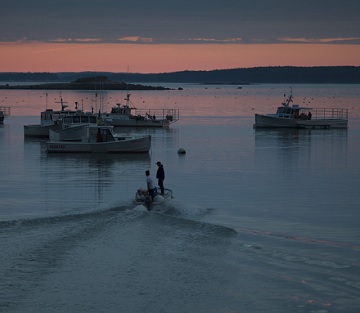
Joe Biden’s mission to Maine
Joe Biden travels to Maine tomorrow (today), the first time he’s made it to the state during his presidency. The trip is part of the president’s Bidenomics tour, a sales pitch designed to lay out the economic case for a second term and underscore domestic manufacturing gains. Aside from the presidential implications, there’s another reason Biden’s visit to Auburn is worth watching. The 2nd District is one of just five across the nation that voted for both Trump and a Democratic member of Congress — Rep. Jared Golden. Golden has been a thorn in the side of the administration, criticizing Biden over debt ceiling negotiations and ripping the White House for “hypocrisy” over its treatment of Maine’s lobster industry. He’s the only House Democrat who voted against Biden’s Build Back Better spending bill. More recently, he was one of only two House Democrats to break with the White House over the student loan debt cancellation plan. >click to read< 09:02

Maine Pols Brag About Stopping Unscientific Lobster Regs in Monsterous $1.7T Omnibus Bill
Maine’s Congressional Delegation and Gov. Janet Mills gave themselves a hearty pat on the back Tuesday for convincing Members of Congress to temporarily halt an unscientific regulatory crusade on the Maine lobstering industry. Maine’s Congressional Delegation has in recent years also voted to massively increase NOAA’s funding, meaning Maine lawmakers helped fund the very crusade they’re now bragging about halting, temporarily. All told, NOAA’s funding has increased by more than $6 billion since President Joe Biden took office, all with the support of Maine’s elected officials. >click to read< 11:09
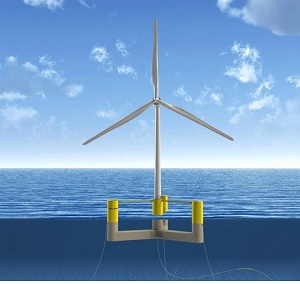
Say no to blood money
New England Aqua Ventus, a joint venture between Diamond Offshore Wind, a subsidiary of the Mitsubishi Corporation, and RWE Renewables, the second largest company in offshore wind globally, was formed to develop UMaine’s floating offshore wind technology demonstration project. The Biden administration is dumping trillions of taxpayer dollars into offshore wind initiatives and offshore wind companies are big donors to environmental causes which was, without a doubt, one reason for Bigelow’s decision to grant this easement to NEAV. Eliminating our lobster industry clears the way for a Gulf of Maine filled with windmills. These global companies are financially supporting the environmental groups that are driving the North Atlantic Right Whale risk reduction measures aimed at eliminating Maine’s lobster industry. >click to read< By Patty Minerich 08:27
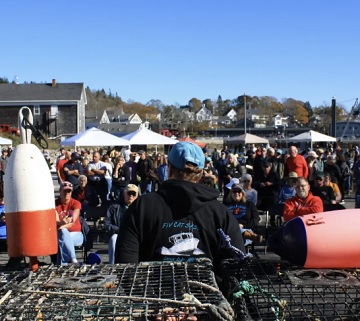
Fishermen and politicians pledge to battle for Maine’s lobster industry in Stonington
More than 200 lobstermen and supporters amassed in the state’s most valuable fishing port Sunday to say they will continue to fight any attempts to put new regulations on the industry. Marine Resources Commissioner Patrick Keliher, one of more than 20 speakers at the rally, said regulators need to get better data on whale migration patterns in the Gulf of Maine. Julie Eaton of Deer Isle, who fishes out of Stonington, said fishermen have repeatedly sacrificed for years, changing their gear to accommodate new regulations. >click to read< 08:31
‘90% reduction decimates this whole town’: Lobsterman’s rally held in Stonington – “If you’re not here fighting for this, there might not be another day,” said Richard Larrabee Jr. “A 90% reduction decimates this whole town, our children ‘s futures. If my son wants to go fishing, he doesn’t have that option.” Video, >click to read<
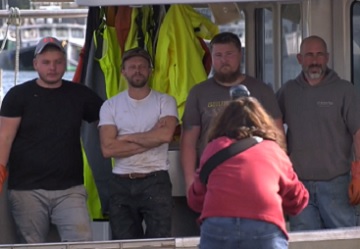
Photographer Cherly Clegg supports Maine Lobstermen with pictures
A Boston based photographer is helping to raise awareness of the battle over Maine’s lobster industry by photographing lobstermen, their families of lobstermen and community members for her “family photo series.” “I heard on the national news David Muri say Monteray Bay Aquarium red listed lobsters I knew this is big. And I thought of all the families I thought of all the fishermen and the younger fishermen and then people who supply bait and then you have the boat builders basically a ton of mom and pop shops sorta thought about it that.” *Ok everybody please* “So I started this to raise awareness. Video, >click to read< 08:27

Congressman Boasts Support for Maine’s Lobster Industry. He Voted To Strengthen the Agency Set To Crack Down on Lobstermen.
Maine congressman Jared Golden has fashioned himself as a champion of his home state’s beloved lobster industry, but the Democrat has won the support of environmentalist groups that advocate for policies that could cripple the livelihood of lobstermen and his votes in Congress strengthen the regulatory agency with the industry in its crosshairs. But the Maine lawmaker has also voted for legislation, such as the so-called Inflation Reduction Act, that directed a combined $6.27 billion to the National Oceanic and Atmospheric Administration, beefing up the regulatory agency tasked with enforcing the regulations that could put lobstermen out of business. Lobstermen associations in New England raised millions to rally support against the regulations, but those efforts appear doomed after the July court ruling. Billy Bob Faulkingham, a Maine lobsterman and Republican member of the Maine House, said Golden’s ties to environmental special interests contradict his claim that he is an ally to lobstermen. >click to read< 07:22
Glenn Chateauvert: Lobster ad shows Golden out of touch with Mainers – >click to read<
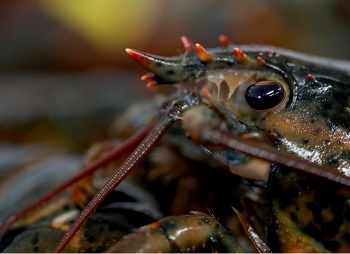
Federal windfall won’t put a stop to state lobster industry relief bills
Although Maine’s lobster industry is set to receive $17 million in federal funding as part of the 2022 omnibus spending package, it is unlikely to affect two bills going through the Legislature that seek more than $30 million in state funds for the industry. The spending bill will bring more than $200 million in funding for projects across the state. For the lobster industry, it includes $14 million to help lobstermen comply with new federal regulations intended to protect endangered North Atlantic right whales, set to take effect May 1, along with $760,000 for the Department of Marine Resources to conduct outreach and education among lobstermen, and $2.3 million for right whale research, monitoring and conservation. >click to read< 17:28
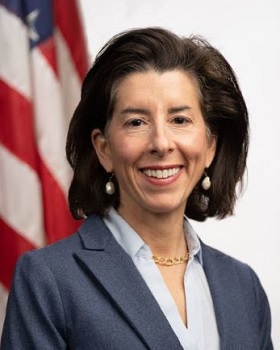
Collins criticizes onerous, unfair regulations on lobster industry
At a Senate Appropriations Subcommittee hearing, U.S. Senator Susan Collins questioned Commerce Secretary Gina Raimondo about several important issues facing the State of Maine, including the unfair right whale rule as well as the implementation of the bipartisan infrastructure bill’s broadband provisions to expand high-speed Internet. Senator Collins has been steadfastly opposed to NOAA’s flawed Atlantic Large Whale Take Reduction Rule, which is harming Maine’s lobster industry without meaningfully protecting whales. Even though NOAA’s own data show Maine’s lobster industry has never been linked to the death of a right whale, NOAA proceeded to close more than 950 square miles of productive ocean area to lobster fishing this winter. Video, >click to read< 18:29
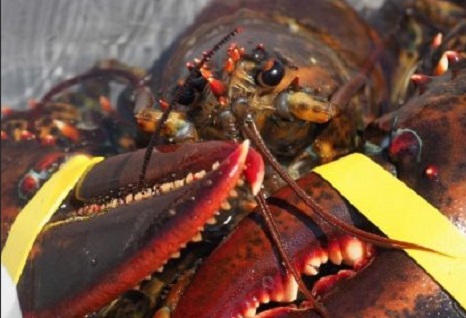
Maine’s lobster industry is in a fight for its survival
In October, a U.S. District Court judge in Bangor had ruled that there was reason to question the federal government’s decision to close this prime lobstering area for four months this winter. When an appeals court overturned this decision in November, lobstermen who had already set traps in this area were forced to dangerously hurry and take them up, creating economic hardship for those who invested in gear, rigged up and were already fishing in these productive waters. For Maine’s lobster industry, this is another frustrating example of one step forward, two steps back. This latest court ruling, however, is just the tip of the iceberg that threatens to sink the fishery. >click to read< 09:57
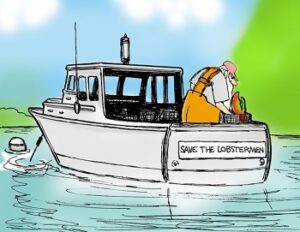
Opinion: Federal rules are sinking Maine’s lobster industry
As a lifelong Maine lobsterman, I understand the inherent dangers of my job. I keep watch on the forecast knowing that sudden weather changes can make the difference between a successful day at work and putting my crew’s life at risk. These days, however, the hazard posed by Mother Nature does not compare with the perfect storm of regulations coming out of Washington that threaten my job, our way of life and may eventually sink a fishery that has supported communities and generations of families here in Maine. By Kristan Porter >click to read< 15:18

Maine’s lobster industry needs your help
A little over a week ago, we saw more than a thousand lobstermen flood the Stonington commercial pier. Almost the entire Maine delegation attended in person to demonstrate its support for lobstermen who are being unfairly targeted around the issue of right whale entanglement. Also speaking and demonstrating their support were Maine Governor Janet Mills, State Senate President Troy Jackson and several other state elected officials. by Julie Eaton >click to read< 12:10
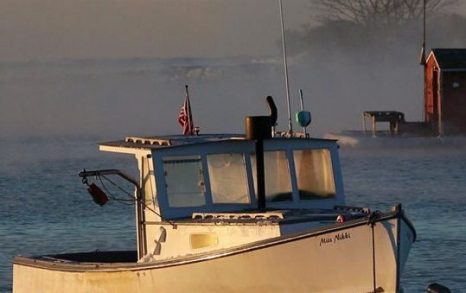
The Feds Are About To Kill Maine’s Lobster Industry And Hurt Thousands Of Workers For Some Bogus Whale Regulation
Big government overreach knows no bounds. The latest example of federal regulation that will threaten thousands of jobs and livelihoods of hardworking Americas comes from the National Oceanic and Atmospheric Administration. The NOAA says that Maine’s lobster industry is to blame for the killing of right whales, an endangered species, and has enacted regulations set to take place this September which will harm the already struggling industry. Yet, the evidence says that the proposed regulation will in no way actually help the whales and will instead only burden lobstermen. >click to read< 17:30
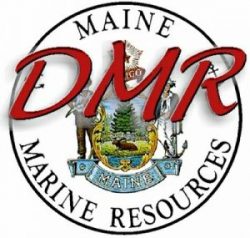
Notice from Commissioner Keliher: Update on Federal Whale Rules
As many of you know, the National Marine Fisheries Service’s Atlantic Large Whale Take Reduction Team (TRT) met last week and recommended broad measures that included a target to remove 50 percent of endlines from the Gulf of Maine. The remaining endlines will also need to be made safer so that, if a whale does come in contact with a line, the rope will break. The outcome for Maine’s lobster industry could have been far worse. Many TRT participants did push for a phase-in of ropeless fishing over five or ten years, large scale closed areas (including two in Maine), and weak rope across the entire fishery. In the end, Maine delegates were successful in pushing back on those proposals,,, Click to read<10:12
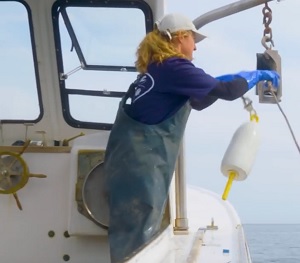
Maine’s Lobster Ladies Officially Kick Ass
Early mornings, heavy traps, rough seas, and scary lobsters. These are just a few of the things that don’t intimidate the women working in Maine’s lobster industry. It’s a tough job, and not only because it requires being awake and on a boat at 5 a.m. It also means being surrounded by a lot of dudes. The expectation of masculinity is built into the language of the trade. Even female boat workers refer to themselves as sternmen, and fishing boats with names like “centerfold,” and “moneyshot” fill the harbor. Video, >click to read<13:31

Low numbers of endangered whales raise question about lobster industry impacts
Woods Hole Oceanographic Institution scientist Mark Baumgartner said that to help the whales survive much longer, the ropes Maine lobstermen use to tend their traps have to be modified or even eliminated. And it’s not just for the whales’ sake. “I feel the industry is in jeopardy,” Baumgartner said.,,, Last month the Conservation Law Foundation’s Portland office filed a federal lawsuit against the National Oceanic and Atmospheric Administration for violating the Endangered Species Act. >click to read< 12:10
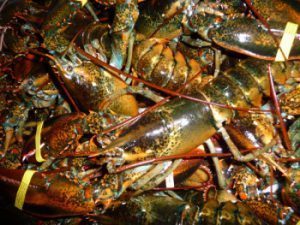
Our View: Time for Maine to look past lobster boom years
There is an economic principle that’s usually attributed to Herbert Stein, who worked for the Nixon administration and The Wall Street Journal. Stein’s law: If something can’t keep going forever, it won’t. Maine’s lobster industry is near the peak of a historic boom, making it the state’s most lucrative fishery. In the last 30 years, lobster landings have increased from 20 million pounds a year to 130 million. No one expects the catch to keep growing forever. The question is not whether it will decline, but when. >click to read< 13:57
Gulf of Maine had cool year in 2017, but is still warming – >click to read<
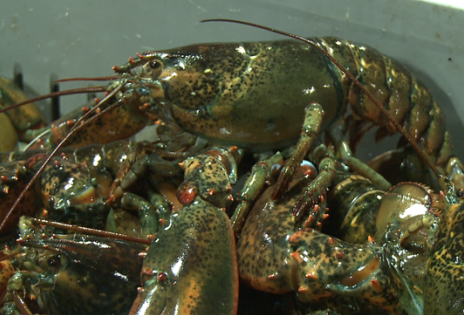
Scientists expect some decline in Gulf of Maine lobster numbers, but ‘no calamity’
Concern about the effects of climate change have reached Maine’s lobster industry, where there are questions whether the state’s record lobster catches can be sustained. There has been wide agreement among fishermen and scientists in recent years that the waters of the Gulf of Maine have been getting steadily warmer as a result of the changing climate. In fact, researchers say the Gulf water have warmed more quickly than most other parts of the ocean. University of Maine researcher Dr. Rick Wahle said warmer water in the Gulf has been one factor in the big jump in lobster landings. He said a reduction in the number of lobster predators and conservation efforts by fishermen are also factors. click here to read the story 14:53
Limited entry for Maine lobster fishery debated
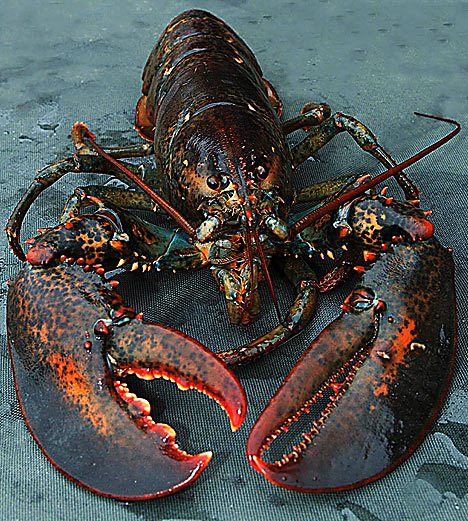 There’s another battle brewing in Maine’s lobster industry, but this is one that likely will be fought in the Legislature rather than on the water. Out to about 12 miles offshore, Maine waters are divided from east to west into seven Lobster Management Zones. Lobstermen are required to declare which of the zones they will fish in based, generally, on where they live. Six of those zones have waiting lists established under the state’s “limited entry” law. People on the list have completed a state-mandated and want a license to fish,,, Read the rest here 11:30
There’s another battle brewing in Maine’s lobster industry, but this is one that likely will be fought in the Legislature rather than on the water. Out to about 12 miles offshore, Maine waters are divided from east to west into seven Lobster Management Zones. Lobstermen are required to declare which of the zones they will fish in based, generally, on where they live. Six of those zones have waiting lists established under the state’s “limited entry” law. People on the list have completed a state-mandated and want a license to fish,,, Read the rest here 11:30
Lobstermen play waiting game while early prices spike, And wait they must!
 Maine’s lobster industry is gearing up for another big year as the state’s 4,500 commercial fishermen wait for lobsters to migrate to the coast and shed the hard shells they’ve been carrying all winter. “The old saying is: ‘The weather gets better before the lobster catch does,’” he said. “It takes awhile for the water temperatures to warm up and for the lobsters to do their thing.” It all comes down to weather – not this weekend’s mostly sunny summer skies but the bitter cold of last winter that chilled the Gulf of Maine. Then a wave of storms in February mixed up the water column and drove those low temperatures at the surface down to lobster habitat at the bottom. Read the rest here
Maine’s lobster industry is gearing up for another big year as the state’s 4,500 commercial fishermen wait for lobsters to migrate to the coast and shed the hard shells they’ve been carrying all winter. “The old saying is: ‘The weather gets better before the lobster catch does,’” he said. “It takes awhile for the water temperatures to warm up and for the lobsters to do their thing.” It all comes down to weather – not this weekend’s mostly sunny summer skies but the bitter cold of last winter that chilled the Gulf of Maine. Then a wave of storms in February mixed up the water column and drove those low temperatures at the surface down to lobster habitat at the bottom. Read the rest here
Good lobster year helps boat builders – Video
 People who work in Maine’s lobster industry have been celebrating after what many say was a good year. The higher incomes mean that after a number of slow years for boat builders, fishermen are once again buying new boats. At Holland’s Boat Shop in Belfast, they said several new boats have already gone out the door and others are under construction. Video, Read the rest here 10:15
People who work in Maine’s lobster industry have been celebrating after what many say was a good year. The higher incomes mean that after a number of slow years for boat builders, fishermen are once again buying new boats. At Holland’s Boat Shop in Belfast, they said several new boats have already gone out the door and others are under construction. Video, Read the rest here 10:15
Maine’s lobster industry feeling pain of slow start – Some say the crustaceans are ‘back on the old time clock’
 David Cousins, president of the Maine Lobstermen’s Association and a South Thomaston lobsterman, said lobstermen expect shedding to pick up and catches to escalate at the end of this month, if not the end of the week. He said the slow season indicates that Maine lobster are “back on the old time clock” of shedding later in the summer. Read more here 09:13
David Cousins, president of the Maine Lobstermen’s Association and a South Thomaston lobsterman, said lobstermen expect shedding to pick up and catches to escalate at the end of this month, if not the end of the week. He said the slow season indicates that Maine lobster are “back on the old time clock” of shedding later in the summer. Read more here 09:13
Lobster forecast causes concern, not panic, for Maine’s industry
Maine’s lobster industry, the state’s most lucrative fishery, may foresee shrinking harvests and higher market prices, but such changes are likely several years away, lobstermen and dealers said Wednesday. portlandpress Read more here 11:09







































